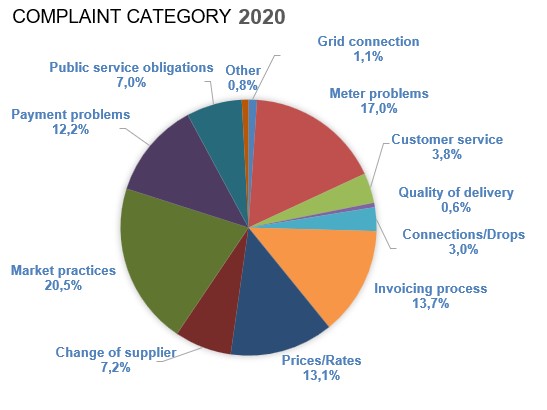During the 2020 operational year, the Federal Ombudsman Service for Energy received a total of 6,639 complaints (6% fewer than in 2019), whereof 63.5% Dutch, 36.3% French and 0.2% German.
According to the Ombudsman Service, this reduction has been caused by the significant reduction in the energy prices during the corona crisis:
“When energy prices do not rise, customers are less often surprised by higher energy invoices when their consumption does not change; this leads to fewer complaints. However, this does not mean that customers should feel comfortable with their energy invoices, because it seems that many customers are still bound by (dormant) extension contracts with prices that may even increase to more than double the prices during the corona crisis,” says Eric Houtman, Dutch-speaking Ombudsman for Energy.
The questions, complaints, and reports received in 2020 were related primarily to:
- sales and market practices of energy suppliers (20.5%);
- meter problems such as the processing and correction of meter data in the event of an annual (digital) reading or estimate, in the event of a defective meter, when moving/vacating a house, etc. (17%);
- invoicing problems such as the (late) issuance and readability of the energy invoices (13.7%);
- the price transparency or the clarity of the (increase in) prices and rates applied (13.1%);
- payment problems for the payment of energy invoices such as instalment plans, (non-payment of) repayments, administrative costs, payment via direct debit, guarantee schemes, (threat of) cancellation of an energy contract or closures due to default (12.2%);
- problems with change of supplier such as unwanted supplier changes and the charging of fixed fees for a full (first) delivery year when the energy contract is terminated early (7.2%).
The other complaints received were related to problems with the quality of customer service (3.8%) and regional authorities (11.7%) such as connections to and disconnections from the grid, power outages, green energy, public service obligations, and the distribution network rates.
Although most of the complaint categories remain the same, the content of some complaints has indeed changed during the COVID-19 pandemic.
- Regarding sales practices, the door-to-door sales, which were not feasible or were even prohibited during the lockdown period, were replaced by remote sales online and/or by telephone.
- Not enough energy suppliers have made efforts to allow their customers to benefit from less expensive prices, because they have chosen to simply tacitly renew more expensive energy contracts.
- In the event of payment problems or non-payment, quite a number of energy suppliers have decided to quickly call on the services of a professional collection agency.
Therefore, the memorandum from the Ombudsman Service to the federal policy-makers remains more topical than ever: https://www.ombudsmanenergie.be/nl/publicaties/advies-19013-van-31-december-2019-memorandum
With these policy recommendations, the Ombudsman Service for Energy wants to improve confidence in the energy market, in particular by proposing several measures in the areas of pricing and (social) rates, the collection and recovery of energy invoices and debts, the commercial practices of suppliers, as well as for strengthening the operations of the Ombudsman Service itself.
More details regarding the disputes and the recommendations per energy company will be announced in the annual report of the Ombudsman Service for Energy which will be submitted to the Federal Minister for Energy and to the Parliament by 1 May 2021 at the latest.
BACKGROUND
The Ombudsman Service for Energy is an autonomous federal service with the status of a legal entity that is competent for the distribution of questions and complaints regarding the operation of the electricity and natural gas markets and the handling of disputes between end customers and the electricity and natural gas companies.
Complaints must be submitted in writing to the Ombudsman Service for Energy:
- by letter: Ombudsman Service for Energy, Koning Albert II-laan 8 – bus 6, 1000 Brussel
- by fax: +32 (0)2 211 10 69
- via the electronic complaint form at www.ombudsmanenergie.be

